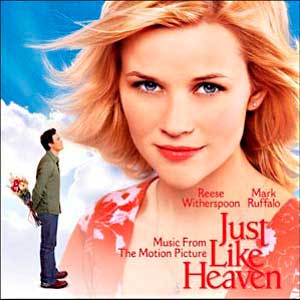Just Like Heaven
Music composed, conducted, and produced by Rolfe Kent
Performed by Studio Orchestra
Orchestrated by Tony Blondal, Stephen Coleman and Kerry Wikstrom
Available on Columbia / Sony Music Soundtrax (5196462000)
Running Time: 61:48
Score Running Time: 15:09
Amazon UK Amazon US

See also:
Sideways Kate and Leopold Just Like Heaven is a 2005 chick flick starring Reese Witherspoon and Mark Ruffalo. One shouldn’t jump to conclusions about such things, and I freely admit that I have not (and am not likely to have ever) seen the film – but reading the plot outline alone is enough to give me a headache. Witherspoon, it seems, plays a young doctor who is killed in a car accident. But – wait for it! – she doesn’t realise she’s dead! Genius! When Ruffalo moves into her apartment, she naturally becomes a little curious, and so does he, given that he keeps seeing her ghost, though – in the most unexpected plot twist in the history of film – they end up falling in love. Who’d ever have thought it?
It goes without saying that the soundtrack album is dominated by songs. For once, it’s not just a random selection of recent hits, but a little more imagination has been used, since more than half of the songs have been newly-recorded for the film. (Few of them are new songs, though.) Pick of the bunch are the lovely Katie Melua’s easy listening version of The Cure’s ‘Just Like Heaven’ (quelle surprise) and Imogen Heap singing ‘Spooky’. At the other end of the scale lie a performance of the famous theme song from ‘Ghostbusters’, by Bowling For Soup (a popular beat combo with the modern youth, so I’m told) and a mauling by Kelis of The Pretenders’ ‘Brass in Pocket’. A few older songs are stuck on as well, from Screamin’ Jay Hawkins to The Cars. (Is anyone actually going to sit through from start to end and like all these songs? It’s such an eclectic mix, I find it rather doubtful.)
After three-quarters of an hour of songs comes one-quarter of an hour of original score, by the talented Scottish composer Rolfe Kente, who seems slightly stuck in these romances (when he’s not scoring things for Alexander Payne, at any rate). It would be nice to hear him score a stronger drama. Still, I suppose one reason he keeps scoring these films is that he’s actually very good at them. You know how the music goes – it’s virtually always the same, regardless of composer – it starts off slightly somber and restrained, gradually building up over its remaining course to the rapturous conclusion. The strings are ably supported by soft horn chords and twinkly piano solos throughout. Kent makes no attempt to abandon the formula (which works so well), but he does manage to inject some of his own musical personality into proceedings, particularly in evidence in the more overtly comedic segments which crop up sporadically. Best of all, the music is full of the charm that dominates Kent’s work. He might well find it hard to personally connect with a film like this, but you’d never guess it from his music , which manages the perfect mix of seeming to be genuine but never pushing the boundaries of plausibility by being over-sincere. (The film would seem to manage to push the boundaries of plausibility perfectly well all by itself!) It’s very light and ultimately very unsubstantial stuff, but is undeniably well-crafted, professionally-done and – above all – entirely charming.
The composer’s fans may be put off by the relatively short shrift given to the score on the album as a whole, but most people will probably find at least one or two songs they’re taken by, so Kent lovers will find much to enjoy. Those who don’t like the scores for romantic comedies are unlikely to be reading these words anyway!
James Southall
Rating:
2.5
Return to Reviews Index